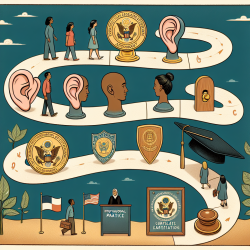Unlocking Children's Potential: The Impact of Early Language Support Practices
In the realm of speech-language pathology, especially when working with children, data-driven decisions are paramount. Evidence-based practices not only enhance the effectiveness of interventions but also ensure that children achieve the best possible outcomes. One critical area where such practices can make a significant difference is in early childhood education. This blog delves into the findings from the research article "Insights Into the Language-Support Practices Used by Early Childhood Educators: Towards Individualized Professional Development Goals" published in the Canadian Journal of Speech-Language Pathology & Audiology, and how these findings can be leveraged to improve practitioners' skills and encourage further research.
The Importance of Early Language Support
Early language development is a strong predictor of a child's future academic success. As such, early childhood educators (ECEs) play a crucial role in fostering language development through their daily interactions with children. The research highlights that the frequency and quality of these interactions significantly impact children's language skills. Therefore, understanding and implementing effective language-support practices is essential for ECEs.
Key Findings from the Research
The study conducted by Bergeron-Morin, Bouchard, and Hamel (2022) examined the language-support practices of four early childhood educators in Quebec. The researchers aimed to document the impact of a professional development program that included co-intervention with a speech-language pathologist (SLP). The findings were insightful:
- Frequency of Use: The study found that while some language-support practices were used frequently, others were less common. Practices such as "highlighting vocabulary" and "encouraging decontextualized language" showed significant improvement after the intervention.
- Variety and Combination: The research underscored the importance of using a variety of practices and combining them within the same interaction to maximize their impact. This approach helps engage children more deeply and supports richer language development.
- Individualization: The study revealed that the effectiveness of professional development could be enhanced by tailoring goals to the individual needs of ECEs. Personalized objectives help educators integrate new practices more effectively into their daily routines.
Implementing the Findings
For practitioners looking to improve their skills, here are some actionable steps based on the research findings:
- Engage in Professional Development: Participate in programs that include co-intervention with SLPs. These programs offer practical, hands-on experience and tailored feedback, making it easier to adopt new practices.
- Focus on Variety and Combination: Aim to use a range of language-support practices and combine them within interactions. For instance, follow a child's lead, ask open-ended questions, and then expand on their responses with richer vocabulary.
- Set Personalized Goals: Work with a mentor or SLP to identify specific areas for improvement and set individualized goals. This targeted approach can lead to more meaningful and sustainable changes in practice.
- Reflect and Adjust: Regularly reflect on your interactions with children and be open to adjusting your strategies. Continuous improvement is key to effective language support.
Encouraging Further Research
While the study provides valuable insights, it also opens avenues for further research. Future studies could explore the long-term impact of these practices on children's language development, the role of technology in supporting language interventions, and the effectiveness of different professional development models.
In conclusion, early language support is critical for children's development, and implementing evidence-based practices can significantly enhance outcomes. By engaging in professional development, using a variety of practices, setting personalized goals, and continuously reflecting on and adjusting strategies, practitioners can unlock the full potential of the children they work with.
To read the original research paper, please follow this link: CANADIAN JOURNAL OF SPEECH-LANGUAGE PATHOLOGY & AUDIOLOGY.










